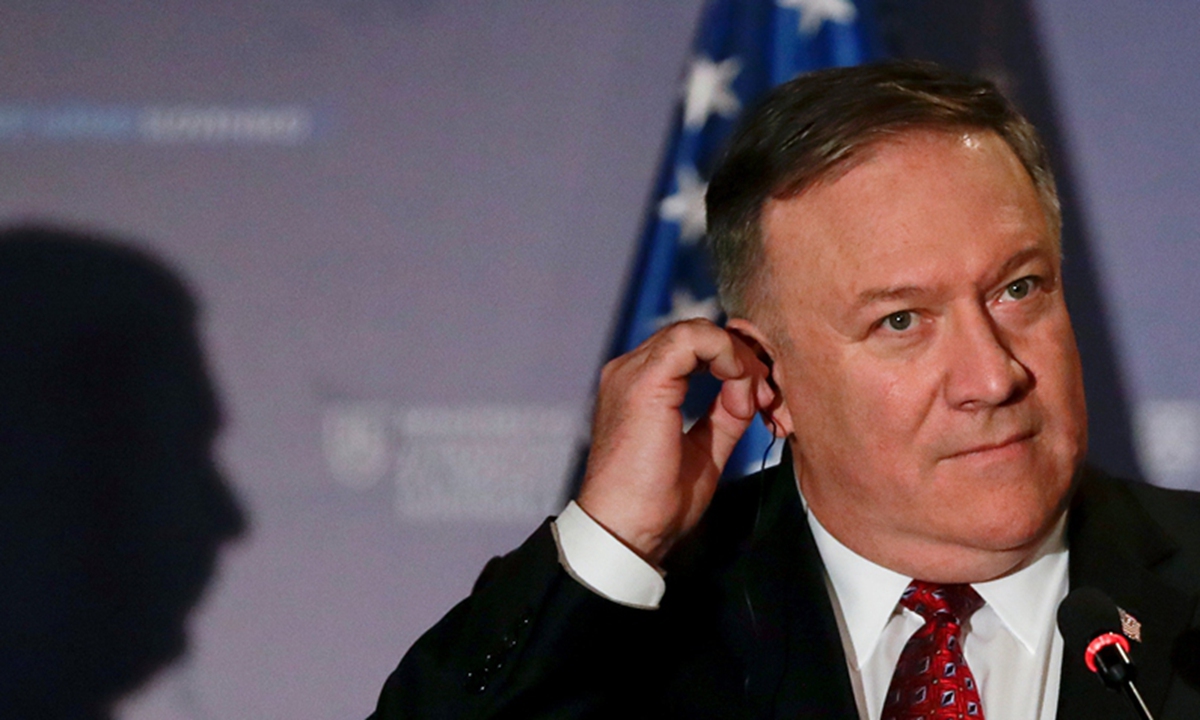Pompeo hits Obama-era strategy for own political gains
By Lü Xiang Source: Global Times Published: 2020/11/26 21:48:41

US Secretary of State Mike Pompeo. Photo: VCG
During an interview with Fox News Tuesday, US Secretary of State Mike Pompeo said that multilateralism is "not in the best interest of the United States of America." This was a criticism of the incoming Biden administration, which will clearly be seeking multilateral channels of diplomacy.
Pompeo was reiterating the position of the administration of incumbent President Donald Trump, believing that Biden's potential moves to consolidate alliances will be detrimental for the country. Before WWII, non-interventionism and isolationism dominated US foreign policies. This still has a considerable following in the US. One of the reasons why Trump won the presidential election in 2016 was because he catered to such groups of people. Many Americans believe it is not cost-effective to maintain the so-called leadership role on the world stage — especially waging wars in Afghanistan and Iraq during the administration of former president George W. Bush. They are wary of building up alliances. Instead, they argue that the US should spare no efforts to construct itself.
Meanwhile, the partisan struggles in the US have become grave. Pompeo's plan for the Republican Party's future is to orchestrate a smear campaign before the latter takes office. Some reports now say Trump and Pompeo may participate in the 2024 presidential election. Lashing out at political opponents could pave their path to achieving future ambitions. Even though Trump lost in the 2020 election, his "America First" policy still has a robust voter base in the US. Indeed, it was his perverse moves that cost him the election, not necessarily his proposal.
In responding to whether or not the "America First" has made America alone, Pompeo said, "our Japanese colleagues, our South Korean colleagues, our Indian colleagues, our Australian colleagues all know that the pivot to Asia was a joke, but that the United States under President Trump actually delivered real benefits to them."
When former president Barack Obama put forward his "pivot to Asia," he intended to build an alliance to check China, but it gradually evaporated. Especially in the Philippines after Rodrigo Duterte took office in 2016. He vocally lashed out at the US. Some Americans argue that the "pivot to Asia" was the biggest mistake of the Obama administration. Biden is expected to make considerable efforts to rebuild US' alliance. But if it is to crack down against a certain country, such as China, Biden will repeat the mistakes of the Obama administration of which he served as vice president.
However, Trump's policy has failed to succeed as well. Although Trump has attached less importance to the alliance, he also hopes other countries can stand along with the US with a bilateral approach. This has turned out to be ineffective as well. Even Australia, one of US' closest allies seems not to be totally aligned with the US either. In July, when Pompeo talked about "a new grouping of like-minded nations, a new alliance of democracies," Australian Foreign Minister Marise Payne followed him and directly said that, "the Secretary's speeches are his own, Australia's positions are our own."
In the post-Cold War era, the prospect of the US' attempts to build a camp to contain a certain country by virtue of its national power, regardless of bilateral or multilateral ways, remains dim.
Furthermore, the "America First" has indeed alienated US with its allies. Their trust in the US is waning. Under the guide of such notions, Washington is making its decision arbitrarily. This is seen with its repeated withdrawal from international organizations and pacts. This has remarkably reduced US' creditability. Even though many US allies are pleased to see Biden's win in the election, they remain doubtful whether there will be another Trump after Biden's term ends. US' credibility is now encountering a severe challenge.
Biden's foreign policy and national security team is being made up of veterans from Obama's time. Biden's team will certainly be very cautious in making its China policy. In addition, dramatic changes have taken place in both the US and the international community over the past four years. Hence, it remains unclear what kind of Asia policy the Biden administration will make.
Though Trump lost the election, he received over 72 million votes. This signals he still has a large following in the US. From this, there has been much discussion on how much resistance the Biden administration will now face. When making and implementing new foreign policies, Biden is not expected to see many obstacles, as US presidents tend to have much power in foreign policy.
The author is a research fellow at the Chinese Academy of Social Sciences. opinion@globaltimes.com.cn
RELATED ARTICLES:
Posted in: VIEWPOINT,CHINA-US